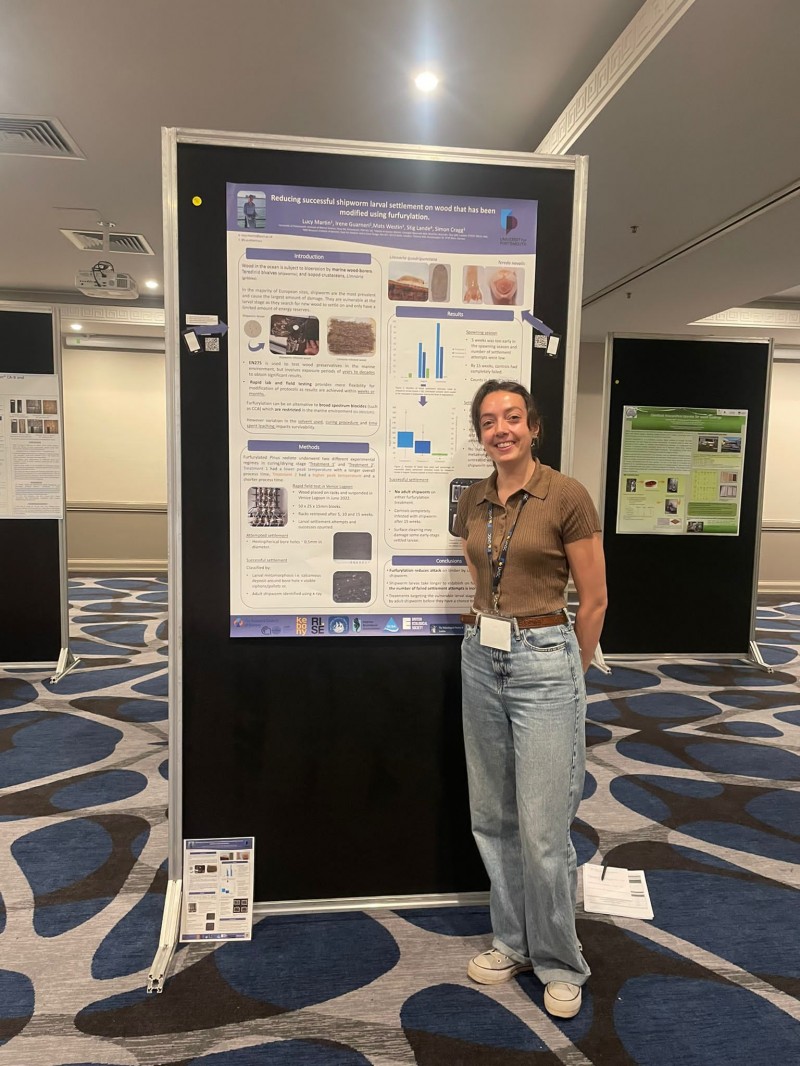International Research Group on Wood Protection’s 54th (IRG54) Annual Conference
Lucy Martin
University of Portsmouth

In June 2023, I attended the International Research Group on Wood Protection’s 54th (IRG54) Annual conference in Cairns, Australia. It was an incredible opportunity not only to network with new colleagues and meet old friends, but also to visit tropical Queensland and the Great Barrier Reef. This was made possible through the travel grant received from the Challenger Society, along with other society grants.
The research group is a society of international experts on all aspects of wood protection, from fire retardancy to durability in marine environments. Wood has been one of the best materials for use in marine applications for millennia, being used for transport (such as boats and canoes), moorings (piers and wharves etc) and sea defences (groynes, sea walls..). One of the major drawbacks to using wood, however, is that it is vulnerable to marine wood-boring organisms; bivalves, shipworm and isopods, Limnoria, which weaken or even destroy structures completely. In response traditional preservatives, including tar, oils, creosote and then broad-spectrum biocides like chromated copper arsenate (CCA), have been used to elongate the service life of timber. However, in the UK and EU, 20-year-old legislations now severely restrict these methods and instead species of wood naturally resistant to borers or novel wood preservation techniques are desired.
At IRG54, I presented my PhD research on using a non-biocidal chemical modification, called furfurylation, to protect wood against biodegradation by marine borers. My presentation - titled “Assessing changes in hardness of wood on a nanoscale to mimic levels experienced by the marine wood-boring crustacean, Limnoria” was the first talk of the conference in the main scientific session, representing the Biology section and working party 1.5 “Marine”. I also was asked to convene the presentations in the marine session which was included alongside talks on natural durability and termite resistance. Later, I gave a 3-minute poster pitch and presented my poster “Reducing successful shipworm larval settlement on wood that has been modified using furfurylation” which won the Rick Ziobro Award along with a prize of A$1000..jpg)
Latest News
Royal Society Publishing Photography Competition 2025
Please see a message from the Royal Society below:
We are delighted to announce that the 2025 Competition is now open for entries until 15 August for a chance to win £1000! The competition celebrates the power of photography in conveying the wonder of science happening all around us and photographs can be submitted in the categories of: Astronomy, Behaviour, Earth Science and Climatology, Ecology and Environmental Science, and Microimaging.
The competition is free to enter and open to anyone studying or working in science at graduate level or above. Category winners will receive a one-year membership to the Royal Photographic Society and the overall winner will receive a grand prize of £1,000. Find out more: https://bit.ly/RSPphotocomp
October 2025 MEDIN Workshop: Marine Data Management, Governance and the MEDIN toolset
The Marine Environmental Data and Information Network (MEDIN) are pleased to announce that registration is now open for the next occurrence of our popular free online training workshop: ‘Marine Data Management, Governance and the MEDIN toolset’ on the 13th – 17th October 2025 on OceanTeacher Global Academy.
Marine Data Management, Governance and the MEDIN toolset
The Marine Environmental Data and Information Network (MEDIN) and OceanWise are delighted to invite you to attend our popular free online training workshop: ‘Marine Data Management, Governance and the MEDIN toolset’ on the 19th – 23rd of May 2025.

.JPG)
.JPG)